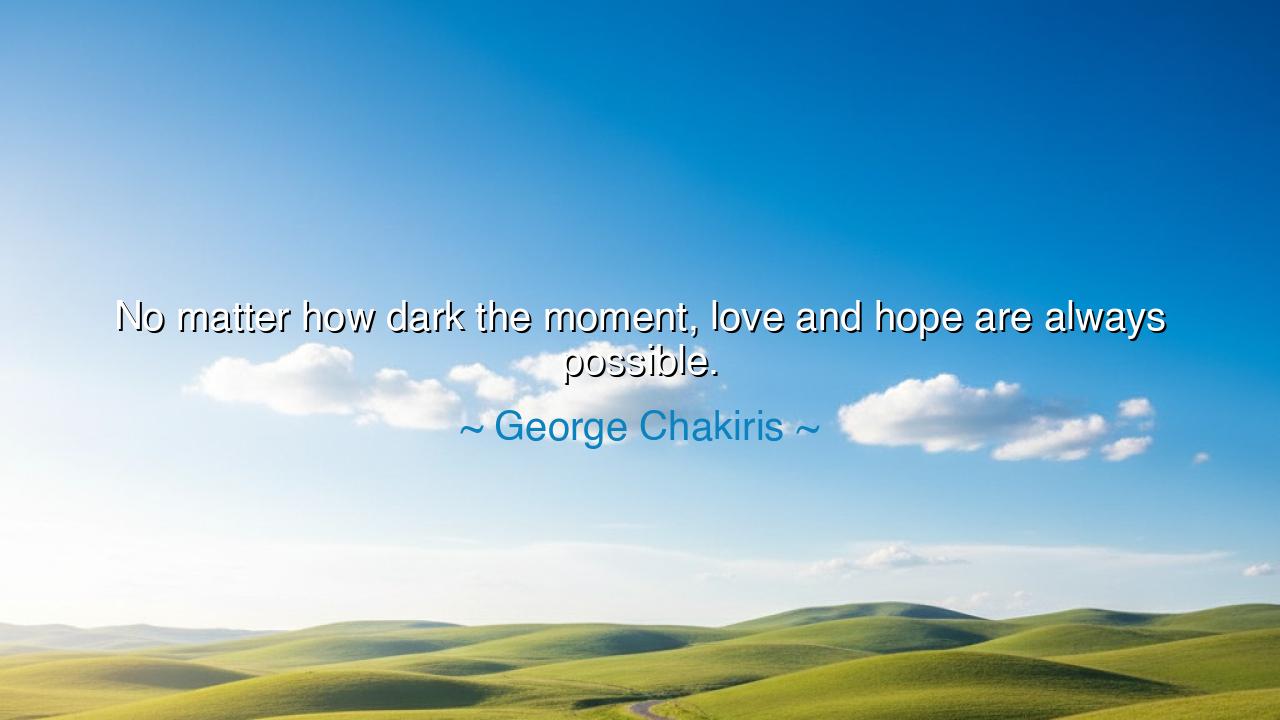
No matter how dark the moment, love and hope are always possible.






“No matter how dark the moment, love and hope are always possible.” Thus spoke George Chakiris, the actor whose art illuminated both stage and screen, but whose words here shine with a wisdom far beyond performance. In this simple, radiant truth, he captures the eternal defiance of the human spirit — that even in the deepest shadow, two lights endure: love and hope. These are not fragile sentiments, but the twin flames that have guided humanity through every age of sorrow. Chakiris’s words are not those of idle comfort; they are the distillation of an ancient law — that as long as the heart still beats, possibility remains.
In the cycles of human history, there have always been nights so dark they seemed endless — wars that devoured nations, griefs that silenced joy, storms that shattered lives. And yet, again and again, the dawn has come, carried not by strength of arms or wealth, but by the quiet persistence of love and hope. These are the powers that no tyrant can extinguish and no despair can consume. When Chakiris speaks of their endurance, he speaks not as a dreamer, but as a witness to the very pulse of life. For to live is to struggle against darkness, and to love is to cast light upon it.
The ancients, too, knew this truth. In the myth of Pandora, when all the sorrows of the world escaped from her jar — sickness, pain, and death — one spirit remained behind: Elpis, the goddess of hope. Even the gods, in their wisdom, left her for humankind, knowing that without her, life would falter. For hope is not blind optimism; it is the belief that even the smallest light matters. And love, its eternal companion, is the force that binds that light to others, multiplying it until even the coldest night begins to warm. Together, they are the foundation of endurance — the invisible architecture of the soul.
Consider the story of Anne Frank, the young girl whose words, written in hiding, have outlived empires. Surrounded by terror, stripped of safety, she still wrote, “I keep my ideals, because in spite of everything, I still believe that people are really good at heart.” This was not naivety; it was courage. It was the very truth Chakiris speaks of — that even in a world burning with cruelty, the human heart can still choose to love, can still choose to hope. Her faith, born in darkness, became a lantern for generations. Through her, we see that love and hope are not luxuries; they are survival itself.
Chakiris’s words also remind us that darkness is not merely external — it lives within us as well. Each person, at some time, faces the shadow of loss, loneliness, or despair. In those moments, the temptation is great to surrender, to believe that the light has gone out. But even then — especially then — love and hope wait quietly, like seeds buried beneath the frost. The wise understand that they need only be tended. A kind word spoken, a memory cherished, a hand extended — these small acts are sparks, and from such sparks, a fire is born again. Thus, the greatest act of courage is not to conquer the world, but to keep faith when the night seems endless.
Love, says the philosopher, is the bridge between souls; hope, the bridge between moments. When one feels far from joy, love brings one closer. When one feels trapped in despair, hope opens a door. The two are inseparable — for to love is to hope for another’s good, and to hope is to love what might yet be. The ancient poets taught that the stars themselves are eternal because they shine for each other. So it is with us: when we offer love and hope to others, we become constellations in the sky of humanity, lighting the way for all who wander below.
Let this be the teaching that endures: never despair completely, for love and hope cannot die. They may hide beneath grief, but they do not vanish. Even in the darkest hour, reach for them — through compassion, through gratitude, through creation. If you cannot find light, be the light. If you cannot feel love, give it. If hope seems gone, speak it into being. The smallest gesture, the faintest belief, is enough to begin the turning of the tide.
For this is the immortal rhythm of life — darkness and dawn, loss and renewal, sorrow and grace. And as George Chakiris reminds us, even when all else falls away, love and hope remain possible. They are the eternal companions of humankind, the sacred inheritance that no shadow can steal. Carry them within you, and you will never truly be lost — for wherever they are, there also is the promise of light.






AAdministratorAdministrator
Welcome, honored guests. Please leave a comment, we will respond soon